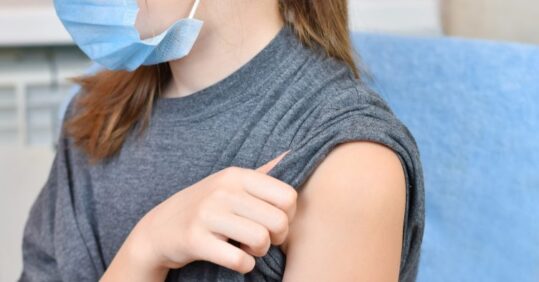Vaccine hesitancy drops among younger people

Hesitancy to receive a Covid-19 vaccine in has fallen among younger age groups and nearly halved among 18- to 21-year-olds in Britain, official figures have shown.
The Office for National Statistics (ONS) data, released on Monday, looked at attitudes between 23 June and 18 July this year for England, Scotland and Wales – and found just 5% of 18- to 21-year-olds said they were unlikely to get the jab if offered, compared to 9% polled between 26 May and 20 June.
Related Article: NHS 10-year plan: What does it mean for nursing?
The research, which surveyed 15,433 over 16s, also revealed reluctance to get the jab decreased from 14% to 11% among 16- and 17-year-olds, who were able to receive a first dose of the jab as of last week. It also fell among 22- to 25-year-olds, from 10% to 9%.
For the ONS survey, vaccine hesitancy refers to respondents who either declined a vaccine or reported being ‘very unlikely’, ‘fairly unlikely’, ‘neither likely or unlikely’, ‘don’t know’ or ‘prefer not to say’ to the survey question asking whether they would accept a vaccine if offered.
Overall, 96% of adults reported positive sentiment towards coronavirus vaccines while 4% reported hesitancy. This was unchanged from previous findings in 26 May to 20 June.
The ONS statistics also showed hesitancy rates were higher among black people than white people, at 21% compared to 4%. Hesitancy was also higher among ethnic minority groups (9%), mixed race adults (7%) and Asian adults (6%).
Related Article: Funded nurse workforce plan needed for neighbourhood health services
It was also higher in people identifying as Muslim (14%), compared with those who identify as Christian (4%). Jewish people surveyed also had a higher hesitancy (6%).
Intensive Care National Audit & Research Centre data released last Friday showed around 6% of Covid ICU patients are aged 16 to 29, with just under 9% of patients aged 30-39.
Professor Adam Finn, a paediatrics professor at the University of Bristol, who sits on the Joint Committee on Vaccination and Immunisation (JCVI), said yesterday this came after some children developed severe illness from Covid and were admitted to intensive care.
Related Article: Over one million children living in homes causing asthma and chronic illness
In May, Moderna announced that its vaccine is effective in 12-18-year-olds after a study saw no cases of Covid-19 in those who had two doses, but it is yet to receive Medicines and Healthcare products Regulatory Agency (MHRA) approval for this age group.
To complete relevant vaccinations and infections CPD modules on Nursing in Practice Learning, click here.

See how our symptom tool can help you make better sense of patient presentations
Click here to search a symptom




